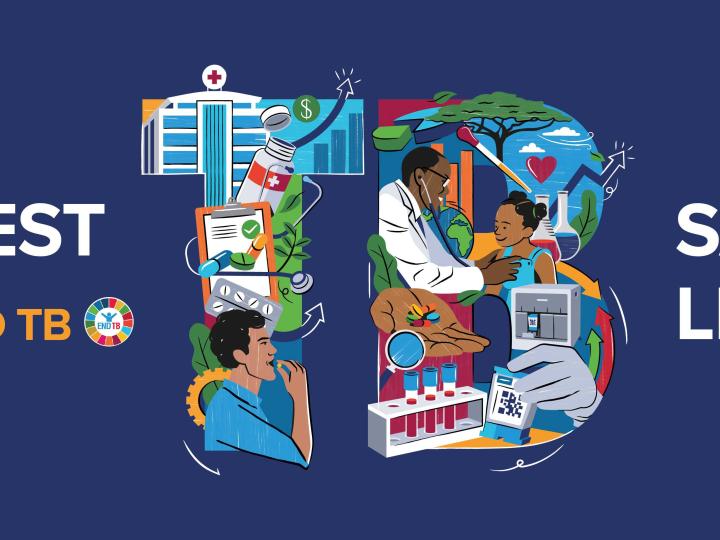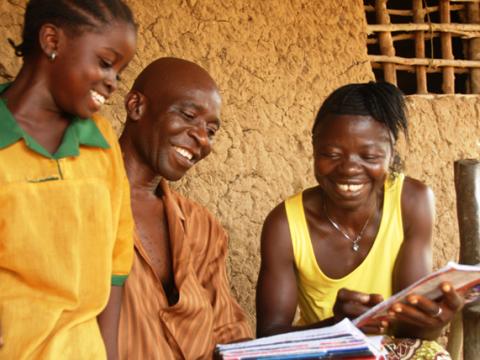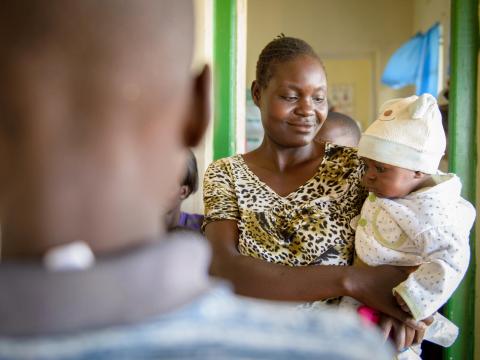
Infant and Maternal Health Programme
Empowering community heroes
Our vision for every child, life in all its fullness. Our prayer for every heart, the will to make it so. Community Health Workers have answered the call. They are the heroes in their communities. We hope to equip and empower them to serve the vulnerable well, allowing children to grow strong and healthy in communities free of need and full of promise.
Transformed and empowered communities are at the heart of our approach to Health & Nutrition at World Vision. We’d like to highlight our Access - Infant and Maternal Health Programme and celebrate the heroes that have come alongside it.
The Access – Infant and Maternal Health Programme
World Vision Ireland implemented the original five-year initiative between 2011 and 2015 in Kenya, Tanzania, Uganda, Mauritania and Sierra Leone. The overall goal was to improve maternal, newborn and child health outcomes and reduce maternal and infant mortality. Built on global evidence for effective, low cost interventions, our programme continues to strengthen community systems to support pregnant women and newborns. World Vision works in partnership with each country’s Ministry of Health, which provides training and oversight. Together, we empower Community Health Workers to save lives and inspire their communities to provide a brighter future for their children.
Many developing countries experience a critical shortage in doctors, nurses, and midwives, especially in remote areas. Highly respected women and men are nominated by their neighbours to fill these needs. Those who answer the call to serve their communities receive training on basic health promotion and preventative care techniques and use this knowledge to counsel women on managing their own health needs. Thanks to these selfless heroes, most of whom are volunteers, new moms deliver healthy babies and keep their children safe from life threatening diseases.
Simple, cost effective and life saving
Community Health Workers volunteer their help every week by visiting pregnant women and mothers in their homes and providing them support, guidance and advice at critical times, using World Vision’s Timed and Targeted Counselling approach. Husbands and extended family are encouraged to play their role in ensuring both mother and baby are as safe and healthy as possible. The Community Health Workers encourage high impact, low cost, life-saving interventions such as good nutrition during pregnancy, delivering a baby in a health centre instead of at home where the risks are much higher and taking their babies to the health centre for check-ups.
To support Community Health Workers, we also train Community Health Committees to assess their community's health needs and to develop action plans to respond to these needs, such as the construction of toilet facilities to improve sanitation. They also bring communities together to raise awareness of healthy practices.
Community members are also equipped to hold their own governments accountable for the promises they make. We call this our Citizen Voice and Action approach. It aims to increase dialogue between those who bear a duty to provide services to the public and ordinary citizens. We mobilise them to advocate together for things such as a new health facility in Sierra Leone, the repair of an ambulance in Uganda, or connecting a health facility to the electric grid. We’re proud to say that each of those has either been completed or is budget approved by the local government!
The results have been incredible
Over 2,000 Community Health Workers have been trained since the Access - Infant and Maternal Health Programme started. By the end of the original five-year initiative, it was estimated that in Guerrou and M’bagne, Mauritania, the number of children dying before their fifth birthday fell by 32% between 2012 and 2015. In Mundemu, Tanzania, it was estimated that the number of mothers dying as a result of pregnancy or child birth fell by 23% between 2012 and 2015.
An independent evaluation, conducted by FARST Africa, concluded that the outcome and impact results indicate that the programme goal of reducing infant and maternal mortality rates by 20% was achieved to the desired level in most programme sites. In addition, the evaluation stated that the sustainability of these maternal, neonatal and child health outcomes was in-built in the programme design, as a capacity-building partnership with government and local communities.
This programme was so successful it won a second round of funding from Irish Aid to continue its work. This project would not have been possible without Irish Aid, which has continued to provide funding and ongoing support. We are extremely grateful for this and the hard work and dedication of the staff at World Vision Ireland.
A unique approach
Our approach to health is to transform communities, changing the way they work for children and creating lasting impact that will live on in generations to come. What makes our strategy at World Vision so powerful is that we take a holistic approach to a child’s health. We believe children are healthiest when all their needs are met.
Our local heroes agree. When supporting pregnant women and their infants throughout the first two years of their life, Community Health Workers also invest in children’s education. The first 1,000 days of a child’s life are crucial for brain development. Read more about our approach to Education.
Community Health Committees also take a holistic approach, working to ensure children have access to clean water and sanitation. In Sierra Leone, they have mobilised their communities to clean health facilities and have been training them about hygiene to prevent the spread of disease. In Uganda, they have helped identify water points that need repair and are developing plans to collect user fees from the community to maintain them. Click here to see more about our work in Water.
A big lesson we learned in the first phase of our programme was the need to focus more specifically on nutrition outcomes and food security challenges. We want to equip families to be self-reliant so children have access to nutritious food and better healthcare. We’ve helped groups in Tanzania set up community fruit and vegetable gardens, with space allocated for the most vulnerable. In Sierra Leone, women’s groups are supporting each other in setting up backyard gardens. We want resilient families. Committees in Sierra Leone have even established emergency funds to help pregnant women and children access health care. Click here to read more about our work in Economic Development.
But there’s more to be done
We cannot rest until preventable maternal and child deaths are a thing of the past. We will continue to do everything we can to ensure women and children have access to the healthcare they need. Our call to service will continue so long as dedicated heroes have the will to come alongside and experience the joy of transforming children’s lives.

